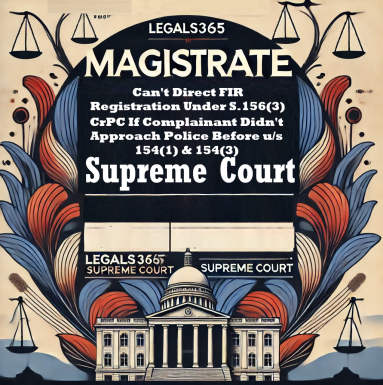
Magistrate Can t Direct FIR Registration Under S.156(3) CrPC If Complainant Didn t Approach Police Before u/s 154(1) & 154(3) : Supreme Court
In a significant judgment, the Supreme Court of India has reiterated that a Magistrate cannot order FIR registration under Section 156(3) of the Code of Criminal Procedure (CrPC) unless the complainant has first approached the police as required under Sections 154(1) and 154(3) of the CrPC. The ruling aims to prevent the misuse of judicial powers and ensure that due legal procedures are followed before seeking judicial intervention.
This decision reaffirms the principles established in the case of Priyanka Srivastava & Anr. v. State of U.P. & Ors. [(2015) 6 SCC 287], emphasizing the necessity of procedural compliance. The ruling underscores the importance of exhausting preliminary remedies before moving the court under Section 156(3) CrPC.
Understanding the Legal Framework
What is Section 156(3) of the CrPC?
Section 156(3) of the Code of Criminal Procedure, 1973, grants a Magistrate the authority to direct the police to register an FIR and conduct an investigation. However, this power is not absolute and must be exercised within the framework of the law.
Mandatory Compliance with Section 154 CrPC
Before invoking Section 156(3) CrPC, the complainant must first comply with:
Section 154(1) CrPC:
The complainant must first approach the officer in charge of the police station and report the offense.
The police officer must record the complaint in writing, read it back to the complainant, and obtain their signature.
Section 154(3) CrPC:
If the police refuse to register the complaint, the complainant must escalate the issue to the Superintendent of Police (SP).
The SP has the authority to investigate the matter or delegate it to a subordinate officer.
Only if these remedies are exhausted can the complainant seek judicial intervention under Section 156(3) CrPC.
Supreme Court's Observations
The Supreme Court bench, comprising Justice Abhay Oka and Justice Ujjal Bhuyan, quashed a Judicial Magistrate's order directing FIR registration under Sections 420 (cheating) and 120-B (criminal conspiracy) of the IPC. The Court ruled that the complainant had failed to establish compliance with Sections 154(1) and 154(3).
Key Takeaways from the Judgment
Judicial scrutiny is essential to prevent misuse of Section 156(3) CrPC.
A Magistrate’s order for FIR registration must be based on due compliance with preliminary procedures.
The complainant must provide clear evidence that they have attempted to lodge the complaint with the police before approaching the Magistrate.
An affidavit must accompany applications under Section 156(3) CrPC, as established in Priyanka Srivastava’s case.
Legal Precedents and Implications
Priyanka Srivastava v. State of U.P.
In the Priyanka Srivastava case, the Supreme Court mandated that applications under Section 156(3) must be supported by an affidavit to prevent frivolous complaints. This ensures complainants take responsibility for their allegations.
Babu Venkatesh v. State of Karnataka
In this case, the Supreme Court reiterated that a complainant cannot bypass the hierarchical procedure outlined in the CrPC before approaching the Magistrate.
How Legals365 Can Help?
Legals365 offers expert legal consultation and guidance to individuals seeking justice under criminal law. Our legal professionals can help you:
Understand your rights and legal remedies under the CrPC.
Draft and file proper complaints in accordance with Sections 154(1) and 154(3) CrPC.
Provide legal assistance in filing applications under Section 156(3) CrPC with necessary documentation.
Ensure that your complaint complies with legal precedents to avoid judicial dismissal.
If you need legal assistance regarding criminal complaints and FIR registration, consult Legals365 for expert guidance and representation.
The Supreme Court’s ruling serves as a reminder that due process must be followed before seeking judicial intervention under Section 156(3) CrPC. By mandating compliance with Sections 154(1) and 154(3), the Court aims to streamline the legal process and prevent arbitrary use of judicial power.
For legal advice and expert consultation, trust Legals365 to guide you through the complexities of criminal law and FIR registration procedures.
#SupremeCourt #CrPC156 #FIRRegistration #LegalProcedure #CriminalLaw #IndianLaw #MagistratePowers #LegalRights #JudicialReview #Legals365
Legals365 offers comprehensive, expert support for all your Magistrate Can t Direct FIR Registration Under S.156(3) CrPC If Complainant Didn t Approach Police Before u/s 154(1) & 154(3) : Supreme Court needs. Our experienced team of legal professionals provides tailored guidance to help you navigate the complexities of Magistrate Can t Direct FIR Registration Under S.156(3) CrPC If Complainant Didn t Approach Police Before u/s 154(1) & 154(3) : Supreme Court cases with confidence. Whether you need assistance with documentation, court representation, or strategic planning, Legals365's Magistrate Can t Direct FIR Registration Under S.156(3) CrPC If Complainant Didn t Approach Police Before u/s 154(1) & 154(3) : Supreme Court services are designed to protect your interests and achieve the best outcomes. We handle every Magistrate Can t Direct FIR Registration Under S.156(3) CrPC If Complainant Didn t Approach Police Before u/s 154(1) & 154(3) : Supreme Court case with professionalism and dedication, ensuring that you receive personalized, client-focused support. Trust Legals365 for all your Magistrate Can t Direct FIR Registration Under S.156(3) CrPC If Complainant Didn t Approach Police Before u/s 154(1) & 154(3) : Supreme Court needs, as we work tirelessly to deliver results that make a difference.
Contact Us Today:
📱 Email: advocates@legals365.com
📞 Phone: +91 9625961599
Choose Legals365 for trusted, client-focused legal support in Magistrate Can t Direct FIR Registration Under S.156(3) CrPC If Complainant Didn t Approach Police Before u/s 154(1) & 154(3) : Supreme Court and beyond. Feel free to ask any question for free or explore answers to questions asked by live users.


